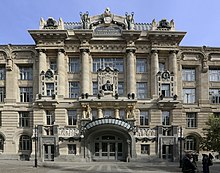The Franz Liszt Academy of Music (Hungarian: Liszt Ferenc Zeneművészeti Egyetem, often abbreviated as Zeneakadémia, "Liszt Academy") is a music university and a concert hall in Budapest, Hungary, founded on November 14, 1875. It is home to the Liszt Collection, which features several valuable books and manuscripts donated by Franz Liszt upon his death, and the AVISO studio, a collaboration between the governments of Hungary and Japan to provide sound recording equipment and training for students. The Franz Liszt Academy of Music was founded by Franz Liszt himself[1] (though named after its founder only in 1925, about 50 years after it was relocated to its current location at the heart of Budapest).
Liszt Ferenc Zeneművészeti Egyetem
| |

The New Academy, facing Liszt Ferenc Square
| |
| Type | Public |
|---|---|
| Established | 1875 |
| Rector | Andrea Vigh |
| Address | |
| Colours | Gold and light blue |
| Website | zeneakademia |
The Academy was originally called the "Royal National Hungarian Academy of Music" and it was also called "College of Music" from 1919 to 1925. It was then named after its founder Franz Liszt in 1925. It was founded in Liszt's home, and relocated to a three-story Neo-Renaissance building designed by Adolf Láng and built on today's Andrássy Avenue between 1877 and 1879. That location is referred to as "Old Academy of Music" and commemorated by a 1934 plaque made by Zoltán Farkas. It was repurchased by the academy in the 1980s, and is now officially known as "Ferenc Liszt Memorial and Research Center."
Replacing the "Old Academy of Music", the Academy moved into a building erected in 1907 at the corner of Király Street and Liszt Ferenc square. It serves as a centre for higher education, music training,[2] and concert hall. The Art Nouveau style building is one of the most well known in Budapest. It was designed by Flóris Korb and Kálmán Giergl at the request of Baron Gyula Wlassics, who was the Minister of Culture at that time. The façade is dominated by a statue of Liszt (sculpted by Alajos Stróbl). The inside of the building is decorated with frescoes, Zsolnay ceramics, and several statues (among them that of Béla Bartók and Frédéric Chopin). Originally the building also had stained glass windows, made by Miksa Róth.
Other facilities used by the Academy are the Budapest Teacher Training College, located in the former National Music School on Semmelweis Street, a secondary school (Bartók Béla Secondary School of Music, Instrument Making and Repair), and a student dormitory.
Ever since its foundation, the Academy has been the most prestigious music university operating in Hungary. A major development in its history was the recent establishment of a new, independent Folk Music Faculty. The Franz Liszt Academy of Music is as much a living monument to Hungary's continued musical life, as it is to the country's musical past.[3] Its president (rector) is Andrea Vigh.
The Franz Liszt Academy of Music hosts the Franz Liszt Museum, also called the Liszt Ferenc Memorial Museum, which shows three restored rooms of the home where Liszt lived at the end of his life, between January 1881 and April 1886.[4] The museum is open to the public for HUF 3000, with alternate pricing for students, families, and children.[5] From May 2023 to May 2024, the museum is running an exhibition "Liszt, the Teacher."[6]
47°30′11.69″N 19°3′52.26″E / 47.5032472°N 19.0645167°E / 47.5032472; 19.0645167